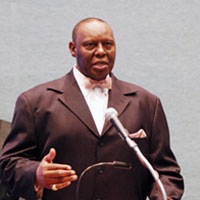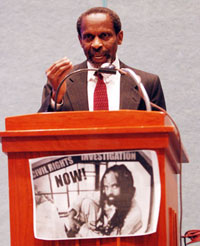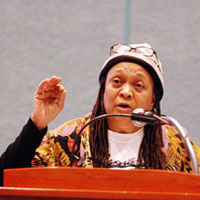Political Prisoners: Government, Police, and Incarceration
By Brian E. Muhammad -Contributing Writer- | Last updated: Mar 10, 2010 - 11:07:36 AMWhat's your opinion on this article?
FinalCall.com) - During the 2010 Saviours' Day Convention, the Nation of Islam (N.O.I.) Prison Reform Ministry held an important workshop titled “Political Prisoners: Government, Police, and Prisons.”

N.O.I. Student National Prison Reform Minister Abdullah Muhammad
|
Chicago Attorney Standish Willis, activists Pam Africa and Mike Africa of the organization MOVE—that was tragically bombed by governmental authorities and law enforcement officials in Philadelphia 25 years ago, all gave their perspectives on the prison industrial complex, political prisoners and a need to counter public apathy.
In the standing room only session, the speakers guided the audience through the price of engaging the struggle for freedom, justice and equality in America. The focal point of the discussion was the predicament of jailed activists who were incarcerated because they challenged an often unjust system and stood up for the marginalized.
With an inmate population of two million people, the U.S. is reported to have one of the highest numbers of incarcerated people in the world. Human rights organizations such as Amnesty International has researched the issue and reported publicly on the topic over the years. However, what is not widely known to the American public is the portion of the inmate population jailed simply because of their political beliefs or activities in furtherance of an ideology not deemed appropriate by the government.

Atty. Standish Willis Photos: Mikal Veale
|
“I think this is an opportune time to test the Obama administration to see if they are really for human rights because there are massive human rights violations that occurred during this COINTELPRO, and we have dozens of Black men and women who are still in prison as a result of this attack on our movement,” Attorney Willis said adding that he is involved in a move to petition the United Nations regarding the atrocities suffered by Black people and activists.
History bears witness to the U.S. Government's imprisonment of leaders for their political views, such as Marcus Garvey, the Hon. Elijah Muhammad, Imam Jamil El-Amin, Sundiata Acoli, Mumia Abu Jamal, Leonard Peltier and Dr. Mutulu Shakur. All of them either are currently or have been political prisoners who were victims of apparent frame-up by the intelligence apparatus of the U.S. government to curtail their liberation efforts among the downtrodden.

Activist Pam Africa
|
“Mutulu Shakir who tried to liberate our people from the slavery of this government; they put this man on American Gangster…he ain't no gangster,” argued Ms. Africa. “We have to be very careful on how they portray us,” said Ms. Africa.
Ms. Africa and panelist Mike Africa are no strangers to the extreme violence at the hands of the U.S. government. On May 13, 1985, the organization MOVE, led by John Africa suffered an assault when the U.S. government dropped bombs on the groups' headquarters killing men, women and children as young as toddlers. In the wake of the devastation, several MOVE members died and others were arrested. Mike Africa's father was arrested and mother—who was pregnant with him at the time—subsequently gave birth in prison.
Ms. Africa spoke extensively on the death row case of Mumia Abu Jamal. She challenged the audience members to stand firm against the attitude of apathy and stagnation.
“We are life with a destiny to be free,” Ms Africa said. “The reason we have political prisoners is because they believed they could stand up against the government, however, when the first rank came, the second rank fell and didn't follow up…they are not sitting in jail because they are guilty, they are in jail because of the apathy of us,” reasoned Ms. Africa.
“Mumia is on death row and we're going to fight to see to it that he comes home, but the thing that we have to understand is that the fight continues,” Mike Africa said. Quoting Harriett Tubman, he further said ‘I could have freed a lot more slaves, if they knew they were slaves'… showing the depth of the problem activists are up against.
In his closing remarks, Student Minister Abdullah Muhammad emotionally represented the scriptural precedent and read a quote from John Africa which said, ‘What a family we are when our aim is unbending, committed to stop this intruder from sucking the blood of our mom (earth) any longer with a power that no man can stand up against. What a family we are when we are one force united, committed to move the world in a hurried through loyalty truth and the word revolution.'
“The people need to know that they can be free,” said Rev. Doris Green whose husband Michael Smith is a political prisoner. “I feel that anyone that is in prison is a political prisoner.”
INSIDE STORIES AND REVIEWS
-
-
About Harriett ... and the Negro Hollywood Road Show
By Rabiah Muhammad, Guest Columnist » Full Story -
Skepticism greets Jay-Z, NFL talk of inspiring change
By Bryan 18X Crawford and Richard B. Muhammad The Final Call Newspaper @TheFinalCall » Full Story -
The painful problem of Black girls and suicide
By Charlene Muhammad -National Correspondent- » Full Story -
Exploitation of Innocence - Report: Perceptions, policies hurting Black girls
By Charlene Muhammad -National Correspondent- » Full Story -
Big Ballin: Big ideas fuel a father’s Big Baller Brand and brash business sense
By Bryan Crawford -Contributing Writer- » Full Story






 Click Here Stay Connected!
Click Here Stay Connected!








